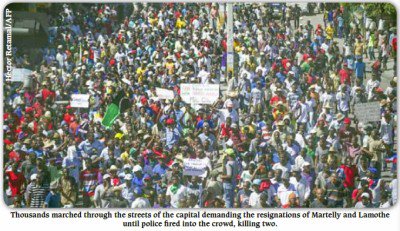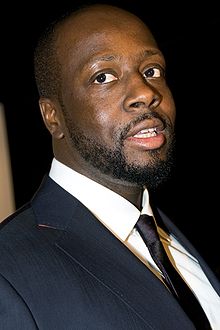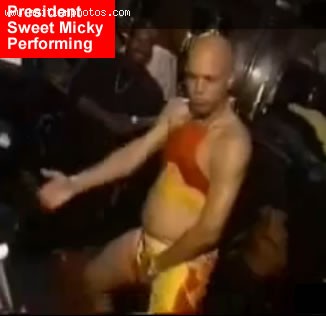
There has been confusion over the past few years about the sudden entrance of Michel Martelly (or Sweet Micky) and Wyclef Jean into the Haitian political arena. A brief survey of the political careers of these two mainstream Haitian musical figures, Wyclef and Sweet Micky, demonstrates which side of history and the illegal U.S./U.N. occupation they are on.

Wyclef
Wyclef’s 1997 Carnival album rocked the musical and cultural world. Haitian teenagers from around the diaspora lip synced the bilingual songs, emulating Wyclef’s Flatbush pace and swag.
Pre-Wyclef, Haitian youth found themselves searching for reasons to be proud of being Haitian in the U.S. Racist stereotypes abounded.
In high schools in Brooklyn, it was common for non-Haitian students to use derogatory language about Haitians, such as the term “HBO” for “Haitian Body Odor.” The US Department of Health blamed Haitians, Homosexuals, Heroin abusers and Hemophiliacs for the spread of HIV in 1986. The spiritual practice of voodoo was misconstrued to further discriminate against Haitians.
Reeling under the circumstances, many Haitian students tried to pass as Jamaican or West Indian to escape from under the yoke of 500 years of accumulated colonial ideological aggression. Wyclef helped forge a proud Haitian American identity. This is part of his reflection in “Sang Fezi.” “Yele” is about Haitians forced to leave Haiti in precarious makeshift rafts, with the dream of making it to and in Miami. Wyclef equated “the boatpeople”–as they became known in Kreyol–to the exodus of the Jewish people in the Old Testament.
An American Dreamer
While Wyclef has made noteworthy cultural contributions, he has a long history of lining up on the wrong side of the struggle back home in Haiti.
Wyclef came out as pro-occupation, supporting the 6,600 United Nations soldiers who have imposed foreign rule over Haiti since June 1st 2004. Reminiscent of Napoleon’s invading army of hundreds of thousands two centuries ago, the UN soldiers repress the democratic aspirations of Haiti’s people.
Wyclef family opposed Jean Bertrand Aristide, the twice democratically elected and twice-kidnapped president of Haiti. Aristide’s true crime was that he inspired, led and galvanized Haiti’s poor. Had Aristide been willing to play politics with the good ol’ boys, he would not have incurred the hatred of Haiti’s true rulers. The right wing attacked Aristide–as they have the leadership of Venezuela and Brazil–precisely because of his incorruptibility.
To understand Haitian politics today one has to begin with the admission that the Aristide, was kidnapped in an illegal, U.S.-orchestrated coup on February 29th 2004. The international and domestic media campaign to discredit Aristide and justify successive coup d’etats was so thorough that it confused many observers.
The 24-7 assault on Aristide polarized Haiti’s oppressed sectors. To this day Aristide remains the most divisive figure in Haiti. Why? Precisely because he represented a radical departure from “ti sou sou blan” politics (American puppets). He demanded reparations for Haiti from the French ruling class. He used the church, ti-legliz, to mobilize the poor and rashe manyok, uproot the system. His slogan “From misery to dignified poverty” struck fear into the hearts of Haiti’s sweatshop owners and debt collectors. From the perspective of high finance, Aristide was bad news.
Whose Role Model?
Wyclef is a role model for Haitian and American youth. However, because he was divorced from the reality on the ground in Haiti, Wyclef was converted into a star-strangled American dreamer. In Ghosts of Cite Soleil, Wyclef–in between taking jabs at Haiti’s leaders of the poor–painted the picture that anyone with a vision can make it in this so called “land of liberty.” He failed to see the connection between the pillage of Haiti by the U.S., France and the rest of the neo-colonial club, and the forced migration of millions of Haitians. Using his air time to mimic the same old cliches, Wyclef converted himself into a harmless icon.
In 2011, Wyclef made a bid to run for the Haitian presidency. His attempt to participate in this rigged process without even a murmur of the illegal deportation of the country’s rightful president was a combination of pure idiocy and avarice, reflecting how detached he was from Haiti’s history and current reality.
Sweet Micky aka Haiti’s “President”
 The president of Haiti, Michelle Martelly, is standing proof of the corruption and greed exercised by “(s)elected officials.” The forces of U.S. occupation have put many jokers into power across the world–from Mobutu to the Shah–but this puppet is uniquely obscene and insulting to the intelligence and dignity of the world’s people.
The president of Haiti, Michelle Martelly, is standing proof of the corruption and greed exercised by “(s)elected officials.” The forces of U.S. occupation have put many jokers into power across the world–from Mobutu to the Shah–but this puppet is uniquely obscene and insulting to the intelligence and dignity of the world’s people.
“Sweet Micky”–as Michelle Martelly was known for two decades–was the “president of Haitian kompa” music. He was considered by many to be a comedian and Haiti’s number one crowd-pleaser. Notoriously lewd and filthy in his sense of humor and expression, Sweet Micky, stopped mid-concert and went on cursing sprees. He has albums entitled 100% kaka and 200% kaka, which translates into any language. A short clip in English –in which the president’s face is blurred out, as if this disassociated him from his vulgar musical career–will give a non-Haitian audience an appreciation of how asinine, reckless and unprofessional this individual is. Sweet Micky’s personality is the merging together of Andrew Dice Clay and R. Kelly. And now he is president of Haiti?
Michelle Martelly has no history in politics. He was simply the latest stooge (s)elected to parrot what the powers that be wanted him to say. A professional memorizer of teleprompters, not any different from most politicians. His emergence as Haiti’s commanding official occurred in an election overseen by occupying troops in which only 16% of the Haitian electorate voted. Parliamentary and municipal elections are two years past due in Haiti.
Here is a powerful report that provides images of what the UN/US occupation looks like in Haiti.
Understanding the “Basket case”
CNN, the New York Times and other mainstream media craft reports making the Haitian quagmire appear to be home grown, distant from anything to do with the United States. Haiti is indeed a political and economic basket case, but one concocted in the offices and boardrooms of the State Department, CIA, United Nations and transnational corporations.
2015 marks 100 years since the U.S.’s first occupation of Haiti. There have been three official U.S. military occupations and countless other incursions to make sure the “right” people are in power in Haiti. To relieve the puppet master of blame is to fail to understand the balance of forces on the ground in Haiti. Solidarity with Haiti entails understanding its history and relationship to the (neo) colonial powers.
Three years after the earthquake, the Struggle Continues
All of the supposed “aid” that goes to Haiti is a joke. It amounts to political symbolism so that highly placed politicians can hide behind a veneer of helping the population.
The total amount of recovery money awarded in contracts and grants by USAID after the earthquake was $1.5 billion. 1% of this aid went directly to Haitian organizations; 56% percent went to firms located inside the capital’s beltway which covers DC, Maryland and Virginia (Center for Economic and Policy Research). There are still over 85,000 Haitians without a home because of the earthquake. 300,000 more live in informal communities on the outskirts of Port-au-Prince.
For the shrewd vultures, tragedy and disaster is but another opportunity to swarm and feast off easy prey.
If charity had a truly empowering effect, aid would be made illegal in Haiti.
The social and political reality in Haiti is that when white missionaries sacrifice a week to go “develop” Haiti, they are labeled heroes. When Haitians sacrifice their entire lives to develop their own homeland and lift the poor out of poverty and dependency, they are labeled communists and executed.
The underlying tragedy in Haiti is the 500 year-long colonial earthquake that has not allowed it to emerge from under the dominion of foreign powers and achieve Dessalines’ and Toussaint’s dream: Self-Determination. How important to expose to a Haitian-American audience Wyclef and Sweet Micky for who they really are–two political tools and nincompoops at the disposal of their masters in Miami and Washington.




powerful and strong writing here Danny well done alan
>
I remember when my parents told me Sweet Mickey was the president of Haiti. I laughed cause I thought it was a joke. He was an entertainer and comedian. The things he would say and do at his concerts were crazy. He is nit fit to be president. I thought Wyclef would be a fit president. I was mad when they said he couldn’t because he had to live in Haiti for a certain amount of time. He was doing more for our people than Mickey ever was. But that just shows who the real people in power are.